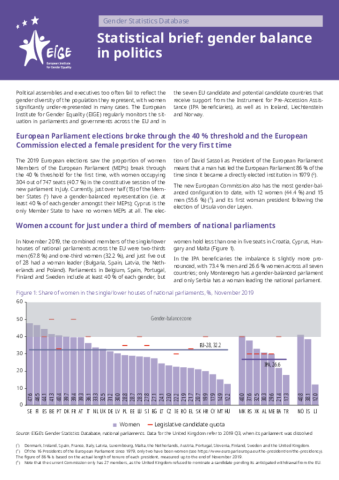Political assemblies and executives too often fail to reflect the gender diversity of the population they represent, with women significantly under-represented in many cases. EIGE regularly monitors the situation in parliaments and governments across the EU, the United Kingdom and in the seven EU candidate and potential candidate countries that receive support from the Instrument for Pre-Accession Assistance (IPA beneficiaries), as well as in Iceland, Liechtenstein and Norway.
Further information
Gender Statistics Database: Women and men in decision-making
Statistical brief: Gender balance in listed companies
Press release: Quotas to remedy gender inequality can bring big change in politics and business
